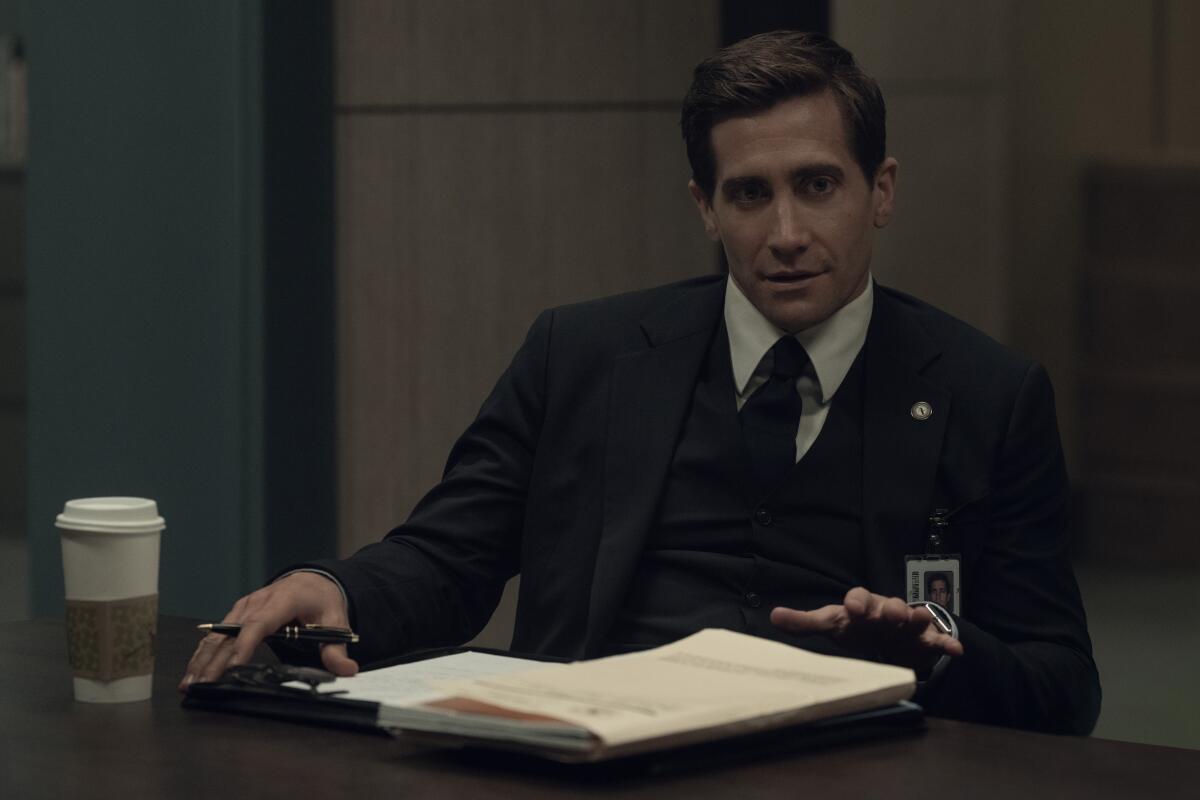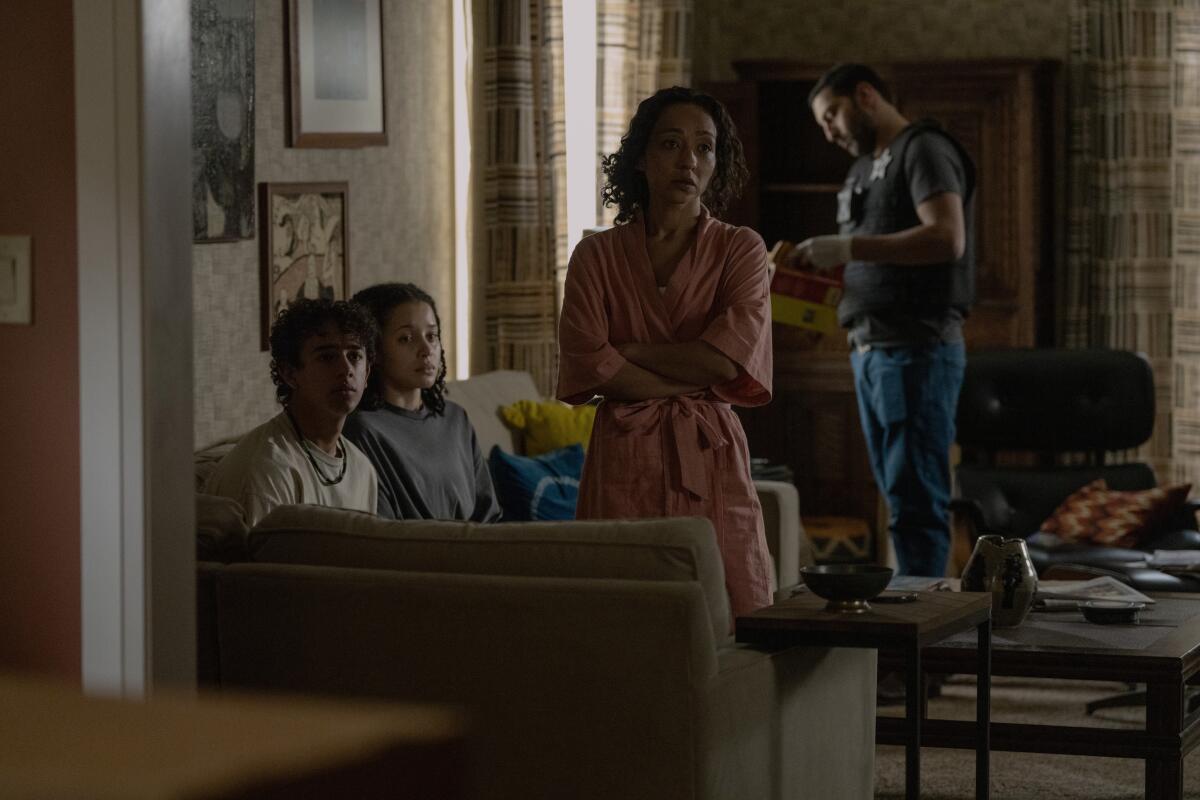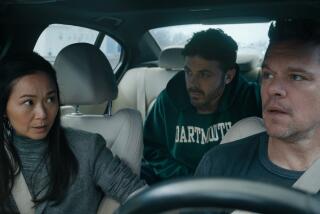Jake Gyllenhaal leads ‘Presumed Innocent,’ a stretched-out courtroom drama

“Presumed Innocent,” which premieres Wednesday on Apple TV+, is a television adaptation of the 1987 Scott Turrow novel previously adapted as a 1990 Harrison Ford film (or an Alan J. Pakula film, to identify the director). A semi-erotic legal thriller, with the indefatigable David E. Kelley as showrunner, it’s a limited series, though at eight episodes, perhaps not limited enough.
Jake Gyllenhaal plays Rusty Sabich, the head prosecutor in the Chicago district attorney’s office, who, as this train leaves the station, learns that his colleague Carolyn Polhemus (Renate Reinsve, in flashbacks and gruesome crime scene photos) has been murdered. The disposition of the hogtied body reminds Rusty of a case he and Carolyn had successfully prosecuted some years before, though the person they convicted, Liam Reynolds (Mark Harelik), is currently in prison.
David E. Kelley’s loose adaptation of Tom Wolfe’s novel depicts two men, played by Jeff Daniels and Jon Michael Hill, whose lives fall apart in parallel.
Rusty is a family man, married to Barbara (Ruth Negga), with teenage children Jaden (Chase Infiniti) and Kyle (Kingston Rumi Southwick), but from the first glimpse we get of Carolyn as a still-living person, we know without being told that she and Jake have had an affair. This will complicate matters when Dist. Atty. Raymond Horgan (Bill Camp), who is up for reelection, assigns Rusty to the case. Rusty’s reputation as a prosecutorial sharpshooter notwithstanding, it seems clear to everyone, except Raymond, that this is not a good idea.
Matters only get worse when Raymond loses his office to new D.A. Nico Della Guardia (O-T Fagbenle) and Rusty is replaced by rival Tommy Molto (Peter Saarsgard) and, what’s more, becomes the prime suspect in Carolyn’s murder — a reasonable supposition given everything we’ve been shown. But Rusty will keeps investigating on his own, with the help of Det. Alana Rodriguez (Nana Mensah).
In order to keep things interesting while filling eight episodes with newly conceived twists and turns, the 20th century story has been expanded with added characters, possible suspects and lines of inquiry. (And updated with smartphones and digital bric-a-brac, which, along with the six- to 10-episode streaming serial series order, have perhaps more than anything changed the way screenwriters tell their tales.)

And because this is from Kelley, former lawyer, creator of “Ally McBeal” and “Boston Legal,” we’ll spend extra time in the courtroom, which is generally time well spent. For the most part, these scenes, which gain currency from this year of courtroom news, feel plausibly true to life. As Judge Lyttle, Noma Dumezweni seems as evenhanded a jurist as one would hope for were one accused of murder, and when things do get overheated, it’s treated as abnormal and dealt with accordingly.
Even more than their plots, mysteries live and die on their characters, and Rusty, who is both the investigator and the accused, is not sympathetic, nor does Gyllenhaal make him interestingly unsympathetic. Indeed, he becomes more tiresome as he grows more desperate to prove his innocence — which is not in itself a foregone conclusion. Yet whether he did or didn’t do it ceases to be an engaging question. Indeed, of all the possible killers — some of whom, I am sure, will not even be presented as possibilities until the last hour — he’s the only person you wouldn’t mind seeing guilty.
But he’s not the only person in this series. Negga makes a strong impression as Barbara, who gets her storyline built out in scenes with a therapist (Lily Rabe) and a therapeutic bartender (Sarunas J. Jackson); the latter gives us perhaps the year’s most unexpected line of dialogue, when the bartender asks Barbara whether she knows about the I Ching and she responds, “I know about John Cage, Brian Eno and the random creative operation of things.” (It’s not an unbelievable response — we’ve seen that she’s arty — but references to aleatory music rarely appear in legal thrillers. Or anywhere on television.) These encounters are a little extraneous to the business of the series, but they give the actress some other notes to play, and she plays them beautifully.
Among other standouts, Camp is appealing as Raymond, doing the best for his exasperating friend. Saarsgard’s Tommy, who’ll be Rusty’s prosecutor if not his persecutor, seems at once something of a schemer and genuinely dedicated to the job, and the actor underplays him to the point of making him intriguing.
It’s a straightforward, mostly unfussy, workman-like production. Only seven episodes were provided for review, so the solution, which may differ from the book and the movie, remains a mystery to reviewers. There’s reason enough to suspect that a new ending might be in the offing given all the novelty that’s come before. And there’s not enough reason to suspect anyone other than Rusty, who, on top of the circumstantial evidence pointing his way, has something of a temper — though, of course, by the rules of the form, this also makes him a less likely suspect.
But as in all mysteries, many characters lie, and so convincingly it can seem that the actors themselves weren’t told the truth. The final hour may ask you to reevaluate any one of them.
More to Read
The complete guide to home viewing
Get Screen Gab for everything about the TV shows and streaming movies everyone’s talking about.
You may occasionally receive promotional content from the Los Angeles Times.








